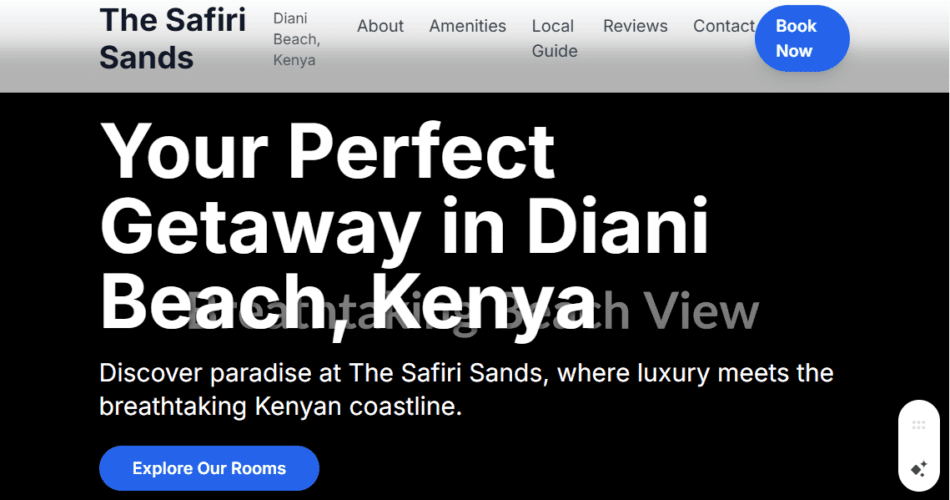Local SEO for Hotels in Kenya
- Delivery Time2 Weeks
- English levelProfessional
- LocationUSA, United Kingdom, United Arab Emirates, New York, Nairobi, Kilimani, Kenya, Dubai, CBD Nairobi, Canada, Australia
Service Description
The cost of Local SEO for Hotels in Kenya is 80000KES per month.Get local SEO for Hotel in Kenya at a price of 30000KES per month at Black Shepherd Technologies.
Boost your hotel’s visibility in Kenya with our expert Local SEO strategies. We help you dominate local search results in Nairobi, Mombasa, Maasai Mara, and beyond, attracting more direct bookings and increasing your revenue. Discover how to get your hotel on Google’s local pack and maps, manage your online reputation with compelling reviews, and create content that travelers love. Transform your digital presence and become the top choice for guests exploring Kenya.
Local SEO for hotels in Kenya is far more than a buzzword; it’s an essential survival and growth strategy in a highly competitive digital landscape. With the vast majority of modern travelers using search engines to research and book their stays, a hotel’s online visibility directly translates to its bottom line. This targeted approach to Search Engine Optimization (SEO) focuses on attracting guests who are physically in a specific location or are actively planning a trip there. By concentrating on localized keywords and user intent, local SEO ensures that a hotel in Nairobi, for example, appears at the top of search results for someone searching for “luxury hotel in Nairobi CBD” or “business hotel near Westlands.” This precision is what sets it apart from traditional SEO, which aims for a broader, less targeted audience, often leading to wasted efforts and irrelevant traffic.
The foundation of a successful local SEO strategy for a Kenyan hotel rests on its Google Business Profile (GBP), formerly known as Google My Business. This is the digital storefront that Google presents to potential customers, and its optimization is non-negotiable. The process begins with claiming and verifying the hotel’s GBP listing, a crucial step that establishes ownership and credibility. Once verified, the hotel must fill out the profile with meticulous detail. This includes the hotel’s Name, Address, and Phone number (NAP), which must be consistent across all online platforms to build trust with search engines. Beyond the basics, a complete GBP listing includes accurate business hours, a detailed description of the hotel’s offerings, and a list of amenities like Wi-Fi, swimming pools, and meeting rooms. High-quality, professional photos and videos of the hotel’s exterior, rooms, and public spaces are also vital. They provide potential guests with a compelling visual experience that can often be the deciding factor in their booking decision.
Another cornerstone of local SEO is geo-targeted keyword research and content creation. A hotel’s website should not only be informative but also speak the language of its local audience. This means moving beyond generic keywords like “hotel” and “resort” and embracing long-tail, location-specific phrases. A hotel in Diani Beach, for instance, should optimize its content for terms such as “beachfront resort Diani Beach,” “family-friendly hotels in Diani,” or “Diani Beach honeymoon packages.” The website’s content, including homepages, service pages, and blog posts, should be infused with these keywords naturally. Creating localized content, such as a blog post titled “Top 10 Things to Do Near Our Hotel in Maasai Mara” or “A Foodie’s Guide to Nairobi’s Best Restaurants,” not only helps the hotel rank for relevant searches but also positions it as a local authority. This expertise builds trust with potential guests and helps them plan their entire trip, making the hotel an invaluable resource rather than just a place to sleep.
Building a strong online reputation is another critical pillar of local SEO for hotels in Kenya. In the digital age, a hotel’s reputation is heavily influenced by online reviews. Encouraging satisfied guests to leave positive reviews on platforms like Google, TripAdvisor, and Booking.com is paramount. These reviews not only serve as social proof for future guests but also act as a significant ranking factor for search engines. Equally important is the hotel’s response to these reviews. Responding to both positive and negative feedback demonstrates that the hotel values its guests’ opinions and is committed to providing excellent service. A professional and empathetic response to a negative review can sometimes do more for a hotel’s reputation than a dozen positive ones, as it shows accountability and a commitment to resolving issues.
Beyond GBP and reviews, local citations and backlinks play a crucial role in boosting a hotel’s local SEO. A citation is any online mention of a hotel’s NAP, and consistency across these citations is key. Hotels should ensure their information is identical on all relevant local business directories, social media profiles, and industry-specific websites. This consistency reinforces the hotel’s authenticity in the eyes of search engines. Furthermore, acquiring high-quality backlinks from reputable local sources, such as local tourism boards, travel bloggers, or news outlets, signals to search engines that the hotel is a trusted and authoritative resource in its community. This link-building process can be achieved through partnerships, sponsorships of local events, or by creating shareable, valuable content that other local businesses and bloggers are likely to link to.
Finally, technical SEO and mobile optimization are often overlooked but are fundamentally important. With the majority of travelers now using their smartphones to search for accommodation, a hotel’s website must be fast, responsive, and easy to navigate on a mobile device. A slow-loading or clunky mobile site will lead to high bounce rates and a poor user experience, which Google’s algorithm penalizes. Implementing schema markup, a form of microdata that helps search engines better understand a website’s content, is also a powerful technical SEO tactic. By using schema markup for local businesses, a hotel can provide search engines with specific information like its address, hours, and review ratings, which can lead to rich snippets and a more prominent display in search results.
In conclusion, a comprehensive local SEO strategy for hotels in Kenya is a continuous process that requires a multi-pronged approach. By meticulously optimizing their Google Business Profile, conducting thorough geo-targeted keyword research, creating compelling localized content, actively managing their online reputation, building a network of consistent citations and quality backlinks, and ensuring a fast, mobile-friendly website, Kenyan hotels can effectively compete in the digital marketplace. This strategic effort not only drives more direct bookings and reduces reliance on expensive third-party platforms but also establishes a sustainable online presence that will attract and convert travelers for years to come








